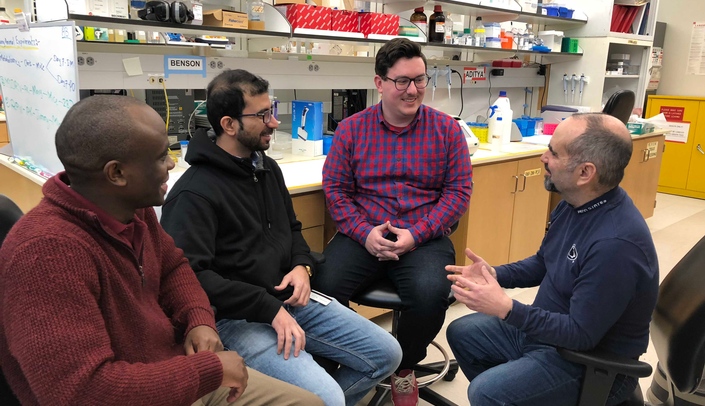In a significant breakthrough that could hasten an eventual HIV cure, a research team at the University of Nebraska Medical Center (UNMC) has changed the chemical structure of an existing antiviral drug to facilitate it in reaching cells and tissues where HIV resides.
The discovery is detailed in the Feb. 5 issue of Nature Communications, one of Nature Research’s leading biomedical research journals.
Using a physiochemical scheme that alters the properties of the drug dolutegravir, UNMC scientists took the modified drug and placed it into nanocrystals. The produced drug crystals easily distributed throughout the body to tissue reservoirs of HIV infection.
The advanced drug scheme extended the life of the drug and its entry into "hidden body compartments," from the muscle site of injection while increasing its action in reducing viral growth. The tissues included the lymph nodes, the bone marrow, the intestine and the spleen.
The modified drug crystals were not toxic, did not break apart with temperature changes and were stable for months of time. All organs and bodily functions remained intact after treatment.
Coated with parts of fat, the crystals efficiently maneuvered through cell protective membranes and were stored inside cells for weeks said Howard Gendelman, M.D., professor and chair, who with Benson Edagwa, Ph.D., assistant professor, co-led the study in UNMC's Department of Pharmacology and Experimental Neuroscience (PEN).
Once stored inside cells called macrophages, the drug was slowly released from the crystal in an altered inactive form called a "prodrug." The cell then breaks the prodrug into an active drug, and the active drug is then released into the circulation from the cell and tissue stores.
"The strength of this system is that it not only can be effective in improving HIV care and prevention," said, Dr. Edagwa, who designed the drug chemical modifications, "but can be applied to many classes of drugs beyond HIV, such as drugs used to treat cancer, other infectious diseases and degenerative diseases that affect the brain."
Importantly, Dr. Gendelman said, "the new products can optimize HIV restrictive growth so that strategies that may eradicate viral infection would be successful."
Drs. Gendelman and Edagwa also recognized two other scientists who were instrumental to the discovery Brady Sillman, a graduate student, and Aditya Bade, Ph.D., an instructor in PEN.
Sillman implemented the concept and completed many of the reports’ experiments and Dr. Bade performed the biological and virological testings.
UNMC has embraced the project, Dr. Gendelman said, with plans to soon complete a nanomedicine production plant that will enable the drugs and others like it to be produced on campus beginning this fall. Located on the 11th floor of The Lied Transplant Center, the plant will be a good manufacturing facility with an operating function similar to many pharmaceutical companies.
Patents have been filed and supported both by UNeMed, UNMC’s technology transfer partner, and ViiV Healthcare, a subsidiary of GSK (GlaxoSmithKline). The research was funded by ViiV Healthcare and by research grants from four institutes of the National Institutes of Health – Drug Abuse, Mental Health, Neurological Disorders and Stroke, and Aging.
Other UNMC scientists and technologists involved in the project included PEN colleagues – Prasanta Dash, Ph.D., instructor; Larisa Poluektova, M.D., Ph.D., professor; Georgette Kanmogne, Ph.D., professor; Santhi Gorantla, Ph.D., associate professor; Saumi Mathews, Ph.D., post-doctoral research associate; Howard S. Fox, M.D., Ph.D., professor; Hang Su, student; and Brenda Morsey, research coordinator – as well as JoEllyn McMillan, Ph.D., associate professor, UNMC College of Public Health; and Yazen Alnouti, Ph.D., associate professor, and Nagsen Gautam, instructor, both in the UNMC College of Pharmacy.
We are Nebraska Medicine and UNMC. Our mission is to lead the world in transforming lives to create a healthy future for all individuals and communities through premier educational programs, innovative research and extraordinary patient care.
Twitter | Facebook | Instagram | YouTube | Flickr
